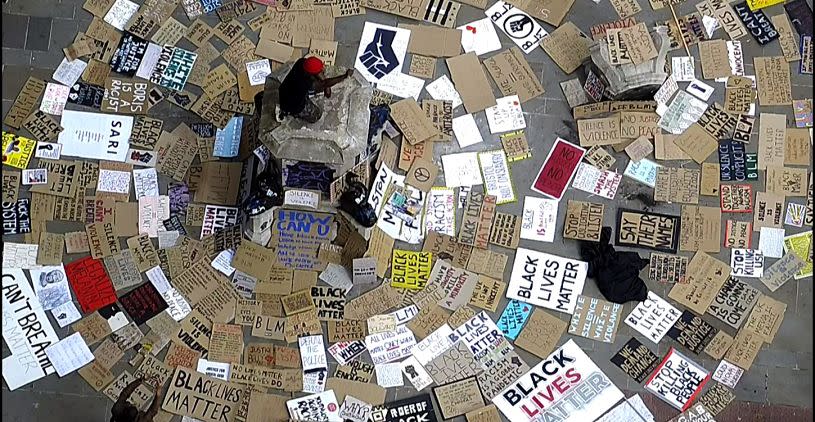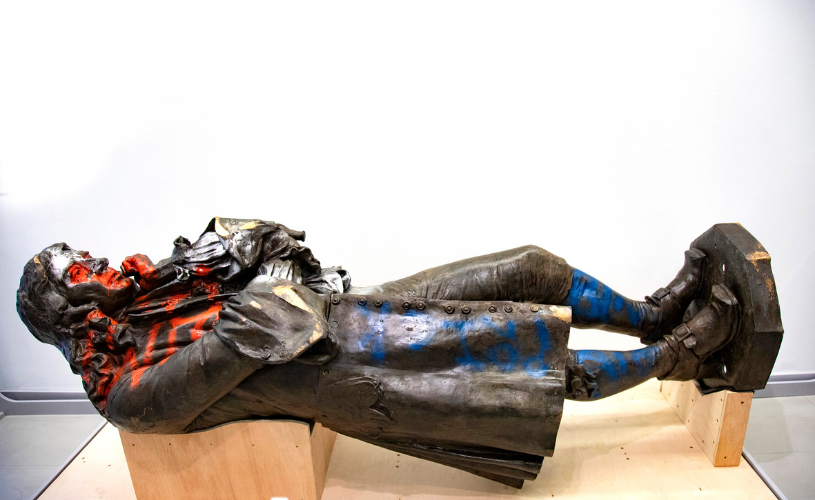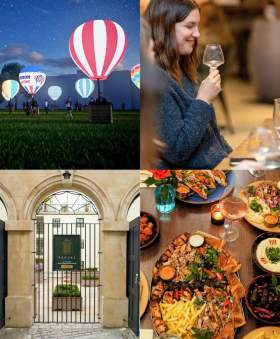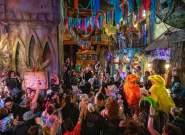On Sunday 7 June 2020, people in Bristol took to the streets to support the Black Lives Matter movement, coming together with similar protests across the world.
During the event, a statue of Edward Colston that has been in the city for around 125 years, was removed and taken to the harbour. The statue has been a focus of debate for many years, with a number of petitions calling for its removal. The coverage of these actions has been global, and many have their own agendas as to the interpretation of these actions.
While not condoning any criminal actions, this is a hugely symbolic and powerful event in the city’s history. Bristol has a reputation for action, particularly when faced with inequality dating back hundreds of years.
What happened was at a time where people are unable to come and visit and stay. We want to reassure those who were considering a trip to Bristol when it is safe and within restrictions to do so, that they are welcome.

Image: Protest banners surrounding the empty plinth on which the Colston statue stood in June 2020, credit Bristol City Council
We would like to offer insights into where more information can be accessed about Bristol’s role in transatlantic slavery and point to some contemporary voices online. At present, there is not a dedicated slavery museum in Bristol.
The Colston Statue at M Shed
Today, the statue forms part of a new display at M Shed alongside a selection of placards from the protest, as well as a timeline of key events leading up to 7 June 2020.

Image: The Edward Colston statue on display at M Shed, credit CB Bristol Design 2021
M Shed
The museum that tells the story of Bristol through its people, has a small exhibition on its first floor that looks at the city's role in transatlantic slavery and you can find information in a selection of their online resources:
- Bristol and the Transatlantic Slave Trade
- Bristol and the Transatlantic Slave Trade: Myths and Truths
- Blood on the Bricks: More than Colston?
There is also a small plaque outside M Shed dedicated to the memory of enslaved African men, women and children which was unveiled in 1997.
The Georgian House
This museum shows what a home of a Bristol sugar plantation owner and person who held people in slavery will have looked like around 1790. A 360-degree tour of The Georgian House is is available online.
John Wesley's New Room
The museum at John Wesley's New Room also has a powerful exhibition about John Wesley and the Methodist response to slavery. You can read more and listen to the audio tour descriptions online.
CARGO
There was a series of events, installations and activities originally planned for 2020 directly confronting Bristol’s role in Transatlantic slavery, including CARGO. A multi-media installation created by Lawrence Hoo, CARGO will provide an empowering, alternative narrative of transatlantic slavery.
Visit Bristol categorically rejects racism. We will continue to keep the Visit Bristol website up to date with information for local people and visitors.
Further reflection
David Olusoga
Historian, presenter of A House Through Time and Bristol resident, wrote an opinion piece in the Guardian on the removal of the Edward Colston Statue, published on 8 June 2020: The toppling of Edward Colston's statue is not an attack on history. It is history.
Best of Bristol
Owen Franklin, a Bristolian writer, filmmaker and composer, has written a piece about Edward Colston for the Best of Bristol website, published on 9 June 2020: Contextualising the deep resentment of Edward Colston.





